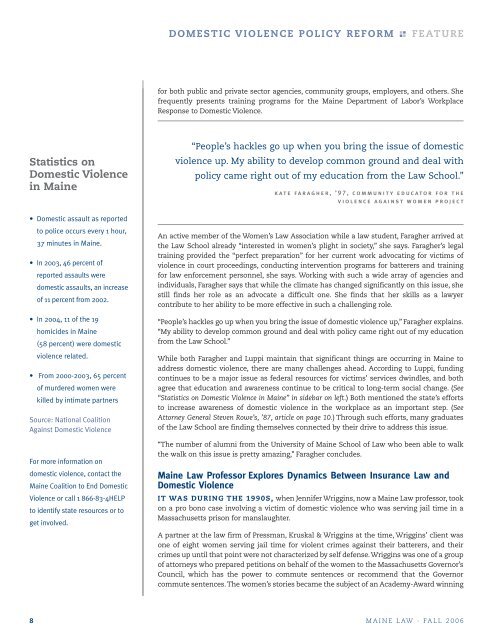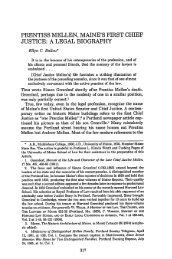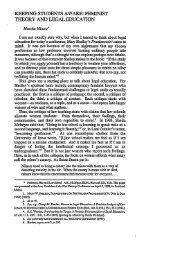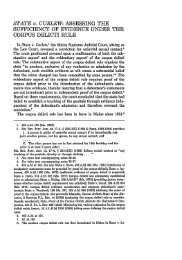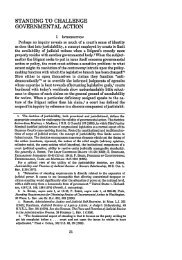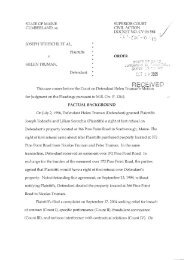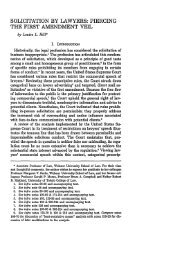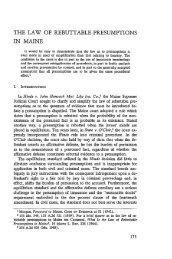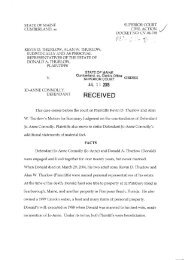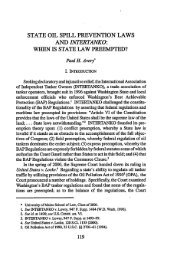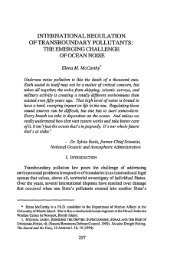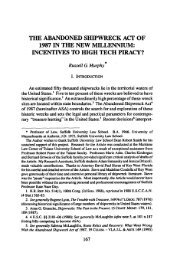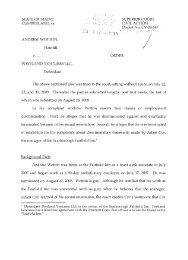USM 0449 ME LawMag - University of Maine School of Law ...
USM 0449 ME LawMag - University of Maine School of Law ...
USM 0449 ME LawMag - University of Maine School of Law ...
Create successful ePaper yourself
Turn your PDF publications into a flip-book with our unique Google optimized e-Paper software.
Statistics on<br />
Domestic Violence<br />
in <strong>Maine</strong><br />
• Domestic assault as reported<br />
to police occurs every 1 hour,<br />
37 minutes in <strong>Maine</strong>.<br />
• In 2003, 46 percent <strong>of</strong><br />
reported assaults were<br />
domestic assaults, an increase<br />
<strong>of</strong> 11 percent from 2002.<br />
• In 2004, 11 <strong>of</strong> the 19<br />
homicides in <strong>Maine</strong><br />
(58 percent) were domestic<br />
violence related.<br />
• From 2000-2003, 65 percent<br />
<strong>of</strong> murdered women were<br />
killed by intimate partners<br />
Source: National Coalition<br />
Against Domestic Violence<br />
For more information on<br />
domestic violence, contact the<br />
<strong>Maine</strong> Coalition to End Domestic<br />
Violence or call 1 866-83-4HELP<br />
to identify state resources or to<br />
get involved.<br />
DO<strong>ME</strong>STIC VIOLENCE POLICY REFORM FEATURE<br />
for both public and private sector agencies, community groups, employers, and others. She<br />
frequently presents training programs for the <strong>Maine</strong> Department <strong>of</strong> Labor’s Workplace<br />
Response to Domestic Violence.<br />
“People’s hackles go up when you bring the issue <strong>of</strong> domestic<br />
violence up. My ability to develop common ground and deal with<br />
policy came right out <strong>of</strong> my education from the <strong>Law</strong> <strong>School</strong>.”<br />
kate faragher, ’97, community educator for the<br />
violence against women project<br />
An active member <strong>of</strong> the Women’s <strong>Law</strong> Association while a law student, Faragher arrived at<br />
the <strong>Law</strong> <strong>School</strong> already “interested in women’s plight in society,” she says. Faragher’s legal<br />
training provided the “perfect preparation” for her current work advocating for victims <strong>of</strong><br />
violence in court proceedings, conducting intervention programs for batterers and training<br />
for law enforcement personnel, she says. Working with such a wide array <strong>of</strong> agencies and<br />
individuals, Faragher says that while the climate has changed significantly on this issue, she<br />
still finds her role as an advocate a difficult one. She finds that her skills as a lawyer<br />
contribute to her ability to be more effective in such a challenging role.<br />
“People’s hackles go up when you bring the issue <strong>of</strong> domestic violence up,” Faragher explains.<br />
“My ability to develop common ground and deal with policy came right out <strong>of</strong> my education<br />
from the <strong>Law</strong> <strong>School</strong>.”<br />
While both Faragher and Luppi maintain that significant things are occurring in <strong>Maine</strong> to<br />
address domestic violence, there are many challenges ahead. According to Luppi, funding<br />
continues to be a major issue as federal resources for victims’ services dwindles, and both<br />
agree that education and awareness continue to be critical to long-term social change. (See<br />
“Statistics on Domestic Violence in <strong>Maine</strong>” in sidebar on left.) Both mentioned the state’s efforts<br />
to increase awareness <strong>of</strong> domestic violence in the workplace as an important step. (See<br />
Attorney General Steven Rowe’s, ’87, article on page 10.) Through such efforts, many graduates<br />
<strong>of</strong> the <strong>Law</strong> <strong>School</strong> are finding themselves connected by their drive to address this issue.<br />
“The number <strong>of</strong> alumni from the <strong>University</strong> <strong>of</strong> <strong>Maine</strong> <strong>School</strong> <strong>of</strong> <strong>Law</strong> who been able to walk<br />
the walk on this issue is pretty amazing,” Faragher concludes.<br />
<strong>Maine</strong> <strong>Law</strong> Pr<strong>of</strong>essor Explores Dynamics Between Insurance <strong>Law</strong> and<br />
Domestic Violence<br />
IT WAS DURING THE 1990S, when Jennifer Wriggins, now a <strong>Maine</strong> <strong>Law</strong> pr<strong>of</strong>essor, took<br />
on a pro bono case involving a victim <strong>of</strong> domestic violence who was serving jail time in a<br />
Massachusetts prison for manslaughter.<br />
A partner at the law firm <strong>of</strong> Pressman, Kruskal & Wriggins at the time, Wriggins’ client was<br />
one <strong>of</strong> eight women serving jail time for violent crimes against their batterers, and their<br />
crimes up until that point were not characterized by self defense. Wriggins was one <strong>of</strong> a group<br />
<strong>of</strong> attorneys who prepared petitions on behalf <strong>of</strong> the women to the Massachusetts Governor’s<br />
Council, which has the power to commute sentences or recommend that the Governor<br />
commute sentences.The women’s stories became the subject <strong>of</strong> an Academy-Award winning<br />
8 MAINE LAW · FALL 2006


